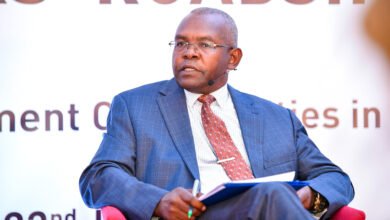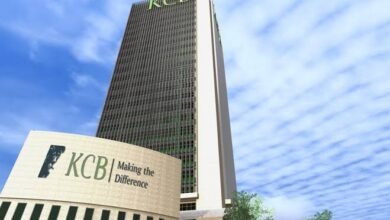
The Central Bank of Kenya (CBK) Governor Dr. Patrick Njoroge’s term is almost running total, following a robust constructive eight-year stint at the helm of the country’s banking regulator.
Dr. Njoroge who was appointed Governor by former President Uhuru Kenyatta in June 2015, has had his tenure extended once, as per the law – in June 2020.
Besides Dr. Njoroge, his surrogate Sheila M’Mbijjewe would also be exiting, having as well held the position for eight years.
Aged 65, M’mbijjewe is a Kenyan borne who holds a bachelor’s degree in accounting, from Kingston University, in the United Kingdom. She is also a Chartered Certified Accountant.

Until February 2023, the CBK has had one deputy Governor contrary to the Central Bank of Kenya Act, Cap 491 which requires the regulator to have at most two deputies.
CBK had two deputies in 2015 when M’Mbijjewe served alongside Haron Sirima who quit the job in October of that year.
Sirima is the current director-general of the Public Debt Management Office at the Treasury since 2018.
Dr. Njoroge is expected to exit the CBK stage on June 17, 2023, and has seen the country through liquidity problems.
Ksh,1000 Banknote Demonetisation
He will be remembered for the highly politicised demonetisation of the country’s old 1,000 banknotes, a move which was keenly effected under the mandate given in the Central Bank of Kenya Act cap 491.
CBK withdrew the old banknotes in what Dr. Njoroge termed as a crackdown on embezzlement and tackling a wave of counterfeit 1,000 shilling notes.
It happened in the wake of grave concern over larger banknotes being used for illicit financial flows in the country and also other countries in the region.
The CBK transferred to the Government Consolidated Fund Ksh.7,387,674,000 related to the demonetisation exercise.
The reform came nine months before the advent of the deadly coronavirus pandemic that has severely battered the country’s economy.
Credit Market Reforms
The pandemic needed robust and drastic measures to cushion Kenyans and the country at large from the shockwaves.
These included the introduction of mitigating measures among them the delisting of Kenyan defaulters with less than Ksh.1,000 from the Credit Reference Bureaus (CRBs).
Other measures also included a waiver on charges for transactions between mobile money wallets and bank accounts since March 16, 2020 which lasted till December 6, 2022.
In the period under review, the monthly volume and value of peer-to-peer transactions surged from 162 million transactions worth Ksh.234 billion to 440 million transactions worth Ksh.399 billion, representing 171 percent and 71 percent increases respectively.
Further, the monthly volume and value of transactions between payment service providers and banks increased from 18 million transactions worth Ksh.157 billion to over 113 million transactions worth Ksh.800 billion, marking five-fold and four-fold increases respectively.
Others were free M-Pesa transactions of up to Ksh.1,000.
Kenya Diaspora Remittances Survey
He oversaw the rolling out of an anonymous online Kenya Diaspora Remittances Survey in 2021 to help guide policies intended to boost the role of remittances in supporting the economy and livelihoods.
The survey focuses on the costs and efficiency of sending remittances, the difficulties encountered in sending cash or non-cash remittances, how remittances are used by the recipients, and the availability of information on investment opportunities in Kenya.
“We urge Kenyans living abroad to participate in the survey since the remittance inflows continue to provide a stable source of foreign exchange for Kenya and a key support for many households,” said Dr. Njoroge.
At the time, monthly remittances averaged USD 290.8 million (Ksh.36.4 billion), with total remittances in 12 months to March that year amounting to USD 3,094 million (Ksh.387.7 billion).
Today, remittance inflows have sustained stronger grounds at USD 349.4 million (Ksh.43.7 billion) as of January 2023 with total cumulative inflows for the 12 months to January 2023 totaling USD 4,039 million (Ksh.505.9 billion).
The remittance inflows hold a key purpose in supporting the current account and the foreign exchange market.
CBK Skyscraper
Dr. Njoroge will be credited for overseeing the construction of the Ksh.2.49 billion 27-storey skyscraper – CBK Pension Towers – located along Nairobi’s Harambee Avenue.
The skyscraper has six basement levels and space for a Kenya currency museum, offices and conference rooms, among other salient provisions. It was commissioned by Kenyatta in May 2022.
Even as Dr. Njoroge and his Deputy M’Mbijjewe prepare to exit, the CBK will, for the next four months have two DGs following the appointment of former Wildlife Principal Secretary Susan Koech by President William Ruto.





